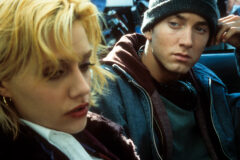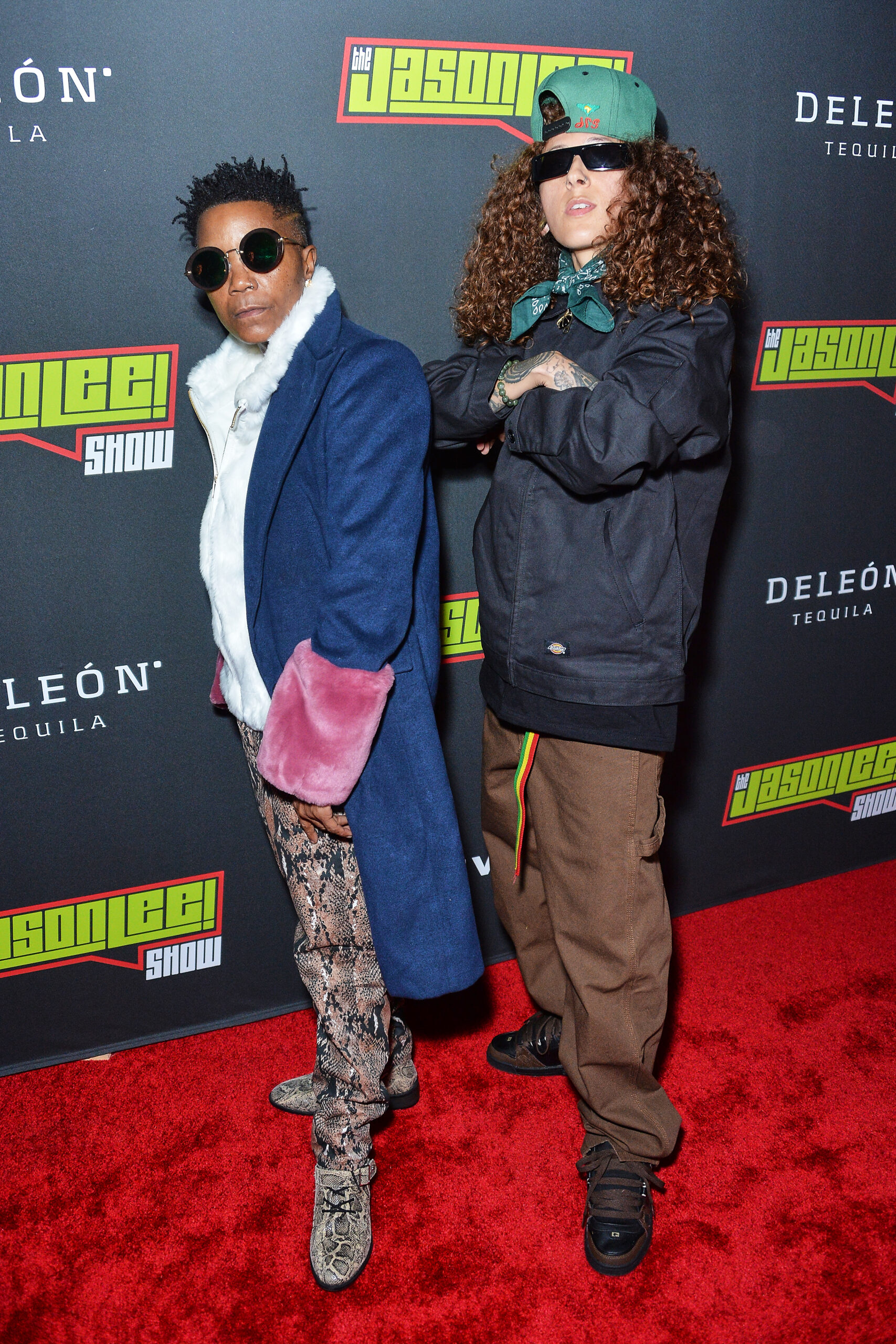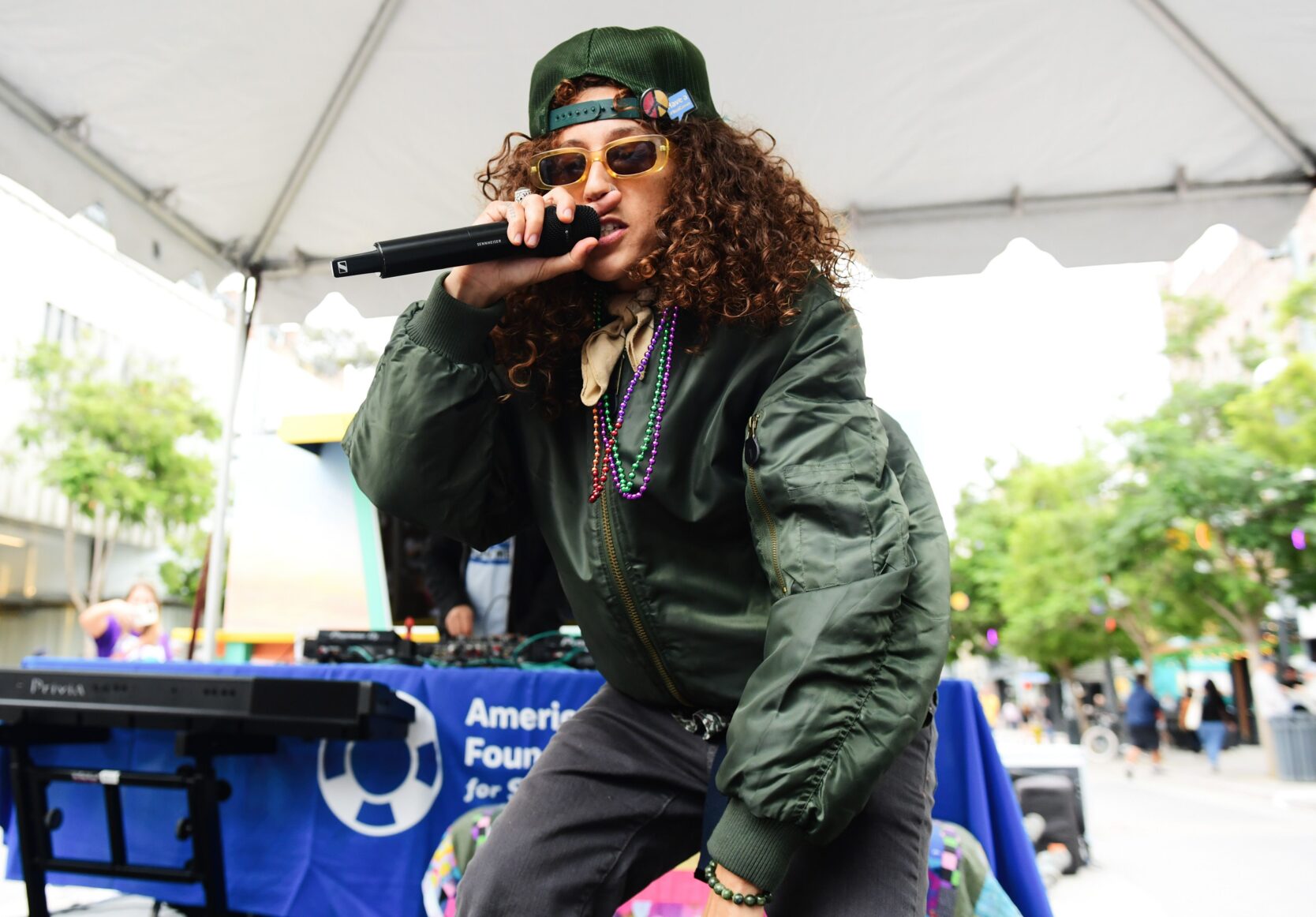Audley played guitar at Rainbow Family orgies, providing background music for foreground action. Hitchhiking with an instrument takes you places.
Audley prefers to keep her first name confidential. The moniker she goes by is her surname, which she shortens to “Aud” – pronounced like “odd.”
Audley presents as unconventional: her hair a massive mound of caramel-curls bouncing around a lightly tattooed, slender face. Inked also are her olive arms, one littered with Alice in Wonderland tats.
Her figure, though spindly, is bolstered by a baggy button-up and pants. A bright orange backward hat tilts forward, nearly meeting the jet-black sunglasses she sports for the entirety of our meeting.

Also Read
Hip-Hop in Film Throughout the Decades
Audley doesn’t mind the occasional “he” when it comes to pronouns.
Yet none of this makes the androgynous artist inherently “odd” – and her pop-facing hip-hop music doesn’t do the deed either.
In fact, her 2022 single “Hoodie Goodie” — despite its focus on feminine fortitude — makes predictable mention of good pussy.
Instead, Audley’s singular distinctiveness emanates from how she carries herself. She openly harbors both wisdom and wetness behind the ears, an aura made all the more palpable, for example, when she drops in that three years ago she was hitchhiking with a guitar, serenading orgies.
Audley keeps her age to herself, only offering that she feels simultaneously too young and too old. I bargain for it as we sit across from each other at SunCafe in Studio City, but she holds strong. Amongst the other things Audley chooses not to tell is which restaurant she works at as an executive director, along with the “nitty gritty details” of her history.
Still, over the course of an hour-plus, I learn a lot about the San Diego native’s tempestuous journey to the peaceful place she says she exists in currently – both mentally and physically. Later she admits, laughingly, that now I may know more about her than anyone on the planet, including her mother.
Today, Audley is under the management of Rene Bowers – also known as Naypay – who plucked the artist from her nomadic lifestyle, moving her to LA where she now lives.

Recently, Audley performed at Linda Perry’s EqualizeHER showcase, a far cry from where she began, but still a long way from the mainstream success she craves.
What’s more, Audely helms a growing community anchored by a pair of positive phrases: “I’d like a nice world,” and “It’s okay to be real.” For Audley, these aphorisms provide clarity in times of immense darkness.
In a clip posted to Audley’s Instagram she sits draped in a baggy, yet well-considered fit, rapping, “When I’m down down, keep it real low. It gets real dark, people don’t know. ‘Cause the bounce back shines so bright – see I faced death, and I found light.”
The video concludes with a picture of an anthropomorphic sun with the same facial tats as Audley – three black dots above each brow – and holding a broken heart. “It’s okay to be real” runs across the bottom.
Ahead of what Bowers calls “big things” coming for the emerging artist, Audley tells SPIN IMPACT of loss, suicide, getting good with oneself, and strengthening her mindset and music through a routine of realness that champions a nice world.
SPIN: How did Audley, the human, come into existence?
Audley: My parents – mom’s French, and dad’s from Jamaica – met in San Diego, had a one-night stand, boogie-oogie-oogie, and there I was.
Dad, who’s based out of Miami, never lived with mom, and mom never lived with dad.
My mom was an alcoholic, so I dealt with that growing up until I left, and dad was just very absent. I didn’t see him but maybe once every seven years, and even then, he had a lot of issues with taking accountability for himself.
On the plus side, I had a lot of music exposure from both of them – they were really into music; they literally met while dancing – but it was definitely a double-edged sword.”
Tell us a little bit more about leaving your troubled home life, hitting the road, and linking up with your manager, Naypay, in LA.
After leaving home in San Diego, I did the whole hitchhiking thing, playing in bars, and learning new instruments. I was quite literally walking across the US, on foot, with a guitar on my back. Then, Naypay reached out to me while I was living in the van that I had soundproofed. That was three years ago.
I’ll never forget people like Naypay who gave me an opportunity to change my life. She never once said, “Okay, here are the keys.” She said, “I’m a producer, here are some tracks, show me what you do.” After I sent her back the first track, she was like, “I see it in you,” and we just kept going from there.
With or without that experience, though, I’d still be making music. Oftentimes, people say to me, “Keep going. Don’t give up,” and while I appreciate the encouragement, I never plan to stop.
How would you describe your music?
It’s definitely hip-hop, but it’s more of a combination of everything I’ve been through. It’s hip-hop, it’s rock, it’s reggae. I was raised west coast, smoking a blunt with the homies by the ocean, and rapping over an instrumental, but I also traveled, incorporated instruments – guitar, banjo, ukulele, harmonica, and hand drums – and got into mountain yodeling, Grateful Dead, and Bob Dylan.
How did you end up at Linda Perry’s EqualizeHER concert at the Troubadour?
Linda actually reached out to me on Instagram and was, like, “Hey, kid, like, what’s the deal with you? Send me your story.” At that time, I had no idea that she and my manager knew each other from back in the day. Anyway, I like to write and I’m a little long-winded, so I basically wrote her a novel in response. We eventually met at Linda’s house to discuss future deals, the showcase, and stuff like that.
That whole experience was so cool for me. Naypay and I had been working on stuff for two years without any feedback because of COVID, so EqualizeHER was a good way for me to really solidify who I am as an artist and see where I stand musically.
What is it like for you to be a gay, masculine-presenting person in music and in general?
I grew up with my mom who always knew I was gay. When I was little, I literally thought I was a boy. I’d cry when they tried to put dresses on me. In preschool, they told my mom, like, “We think you need to take her to counseling or something because she only wants to play with boy toys.”
So, my mom took me to counseling, and after some testing, they were like, “We think this child has gender dysmorphia.” My mom was like “Is she healthy?” And they were like, “Yes,” and she was like, “Okay then, we’re finished here.”
I have to thank my mom immensely for that because she really validated who I am, and that’s so important in order for a human to evolve.
My father’s Jamaican side was very, like, “Oh no no no, we’ll hang you up in the banana trees if you come out here as a masculine-presenting woman.” And with that, I really had to choose who I was going to be, who I am.
I feel really blessed to know myself and to finally settle into it. And that plays into the music aspect, too, you know? I will never give up because I never really saw anybody like me in the mainstream media. That motivates me to be myself. I want anyone who is weird like me to be like, “Whoa, I didn’t know that that was possible for somebody who looks like that.” Hopefully, it makes them feel like they can do it too.
Where did “I’d like a nice world” and “It’s okay to be real” come from?
“I’d like a nice world” spawned right in the middle of COVID – it was just pure chaos. And then we had the Black Lives Matter movement where, collectively, we all got to see how racism still exists. So, “I’d like a nice world” was a moment of clarity, for me, where I was just like, “I respect everybody’s belief systems.” It’s a guidepost for me, it reminds me of what kind of path I’m on.
On top of that, I lost so many of my homies to suicide, drug overdose, prostitution, gang violence, and murder. I went through all of that growing up. And what set me apart was my focus; I was clear about what I wanted to do with my life and I took action to go in that direction.
I was choosing to go to the library and read instead of going out and getting involved with gang violence and shit. Choices like that took me out of my environment. So “I’d like a nice world” is the foundation of that clarity. But I do want to emphasize, and this is really important, that that does not mean that you’ll be a nice person. I don’t think I’m a nice person, but I do think I’m a good person.
Also, I used to be suicidal, you know? That was something I went through and overcame, but when I was going through it, I wish somebody had said to me, “It’s okay to be real.”
If you’re not good at the moment, it’s okay to be real about that.
What’s next?
We have big moves under wraps for now, but, in general, we’ll be dropping new music, having more shows, and the public will be hearing from me a lot more.
I’m definitely aiming to infiltrate mainstream music, which, so far, has been a difficult-slash-easy process. I’m coming from having had a lot of freedom to now having to lean into this specific formula for mainstream music. I’ve taken on a student role in figuring out what that recipe is while also really respecting its league. I used to kind of be like, “Man, I play instruments and this mainstream, kid shit, is really trying to dumb my shit down,” but I respect each league now and how things go.
Naypay is also masculine-presenting, and we’re a duo, so our goal is to definitely see more people like us go mainstream. I’d like to get on these charts, and I want kids at home to see us doing this and realize that the world can love someone who’s different.
I’ve always said, if I’m going to be famous, it has to help people. Same thing with being rich. It doesn’t feel good to do anything just for me. But fame, wealth, and recognition would give me the power to do things on a larger scale and be of service. I’d eventually like to open a small studio/gathering space where people can come to eat, create, converse, and contribute to making a nice world.




